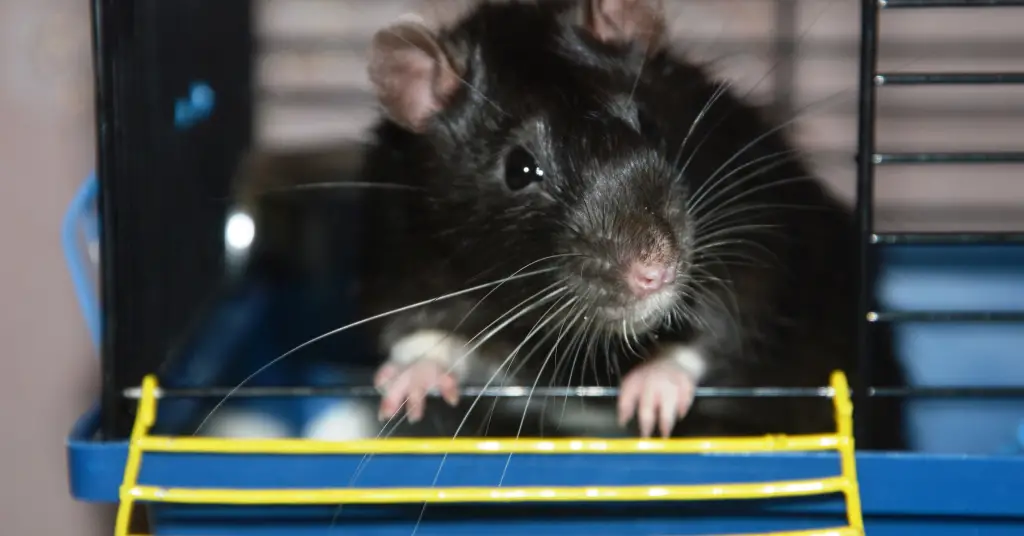Why is my rat chewing on the cage? Is it expected behavior or something I should be worried about? The truth is rats display this behavior for a variety of reasons. This article will explain what they are, what they mean, and how to deal with them appropriately.

One of the main causes of rats chewing on cages is a lack of stimulation
Rats are extremely energetic little creatures and they need a lot of stimulation to stay happy and healthy.
When rats are bored, they will often start to chew on their cages in an attempt to find something to do.
This can cause serious damage to the cage and may even injure the rat.
One way to prevent this from happening is to provide the rat with plenty of stimulation and toys.
Puzzle toys are a great way to keep rats entertained and engaged, and they can also help to promote healthy cognitive development.
Chew toys are another good option, as they provide a safe outlet for chewing behavior. By providing your rat with plenty of stimulating toys, you can help to prevent them from becoming bored and damaging their cage or their own mouths and teeth.
In fact, giving a rat a proper chew toy is crucial to their dental health.
As rats’ teeth are constantly growing and never stop, they need to chew on things in order to keep their teeth at a manageable length.
If they don’t have anything to chew on, their teeth can grow too long and cause problems.
Chew toys also help to keep a rat’s gums healthy by massaging them and promoting blood flow.
But, Sometimes rats have plenty of chew toys and still chew on their cages.
In this case, there are several more reasons why they may be displaying this behavior.

The cage itself may not be appropriate for your rat
When choosing a cage for your pet rat, it’s important to select one that is the right size and has ample space for your furry friend to run around and explore.
However, you also need to be aware that rats are natural chewers, and they may gnaw on the bars or other parts of the cage if they become bored or stressed.
If you notice that your rat is chewing on the cage, it may be an indication that the cage itself is not appropriate for your pet.
Consider upgrading to a larger cage or adding more toys and enrichments to keep your rat occupied. By taking these steps, you can help ensure that your pet rat has a comfortable and safe home.
Certain types of cages are also more inviting to be chewed on than others, for example, wood cages may be more likely to suffer from chewing damage than metal ones. Taste better too.
Rats may also chew on their cages if they are not getting enough exercise. Like all animals, rats need to exercise in order to stay healthy.
If your rat is cooped up in a small cage all day with no opportunity to run around and explore, it may start to chew on the cage out of frustration.
Be sure to provide your rat with plenty of space to exercise and play as well as an appropriately designed cage with good rat-safe materials.

Rats are social and like to be with more of their own
As anyone who has ever seen a group of rats scurrying around knows, these animals are social creatures.
They like to be with more of their own kind, and they communicate with each other through a variety of vocalizations and body language.
While rats may not be as affectionate as some other pets, they can still form strong bonds with each other. In fact, research has shown that rats comfort each other when they are stressed and will even go out of their way to help a wounded friend.
When a rat doesn’t get the companionship it desires, It may start to chew on its cage as a way of expressing frustration, and stress and even go as far as being outright depressed.
If you think your rat may be lonely, consider getting another rat as a companion. Just be sure to do your research first and introduce the rats slowly so that they can get to know each other in a safe and comfortable environment.

And of course, Your rat wants to get your attention the most
Most of all, and probably the most common reason for cage chewing, is to get your attention.
Rats are very intelligent creatures, and they quickly learn that certain behaviors get them the attention they desire.
If your rat has learned that chewing on its cage gets you to come over and give it a treat or some other form of positive reinforcement and love, then it will continue to do so in order to get that same response.
The best way to stop your rat from chewing on its cage is to ignore the behavior when it happens.
Don’t give your rat any attention, positive or negative, when it is chewing on the cage.
Once your rate stops chewing, That’s when you can give it the attention it desires.
This way you will overwrite the old learned behavior for a new one, where your rat only gets attention when it’s not chewing on the cage.
Bottom Line, Rats need stimulation, attention, and more importantly, love. If you give them what they need, they will be much less likely to chew on their cage out of boredom, frustration, or stress.



